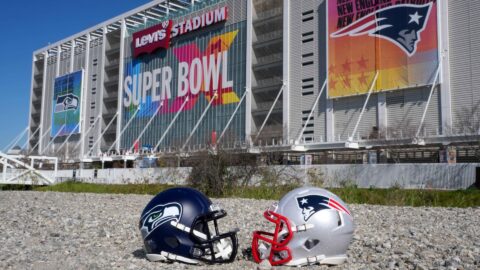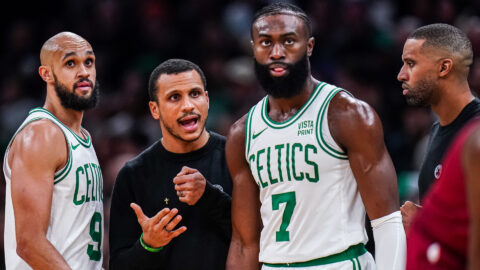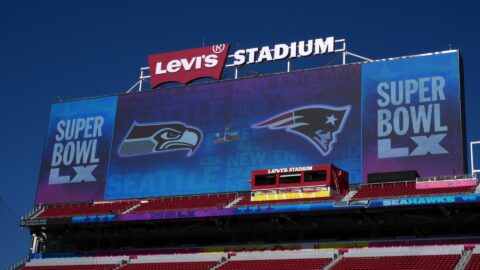 What does a shooting at a rural elementary school have to do with sports? Well, everything.
What does a shooting at a rural elementary school have to do with sports? Well, everything.
Two camps have separated out since news first came of what happened at Sandy Hook Elementary School in Newtown, Conn., on Friday morning. One part is a world that is reeling and trying to understand what happened, what can be done to heal the pain, and what can keep such tragedy from ever happening again. The other part is the one that is looking away, clicking away, moving away from thinking, devouring, knowing what happened.
Maybe, if we don’t read about it, it won’t be true. Or maybe, if we act like it’s normal that we see stories of office and school shootings all throughout the year, year after year, whether the antagonist was troubled or bullied or depressed or using video games or just there, it won’t hurt as much.
In Iraq and Afghanistan, car bombings and suicide missions happen with such frequency that you have to wonder whether people there know to just look away, to not take it too hard, to not ask whether it could be another way. And maybe, if what happened Friday keeps happening, Americans will find such an approach is the best way to deal with what was once unthinkable.
In sports, the two camps have become mixed in recent days. The sports world tried to pay respect while still serving its chief purpose. But, while attempting to understand the gravity of Friday’s events and dull the pain however it could, the headlines have clamored on. The Pats and G-Men may be wearing decals on their helmets Sunday to honor victims, but there’s no avoiding that the news feeds have been talking about Melo this and Butler-Indiana that while the rest of the world deals with the questions that define life.
But in this way, sports has taught its best lesson. It’s one thing to say sports unites people and can help with some of the pain that a horrific event brings. It’s another to realize that, for most of us, sports is the place we go to escape, to find a reason to smile in a joyless world. Sports tells us something about ourselves and provides us with a way to respond.
But there’s one more function that sports can have at a time like this, either for those who are trying to make sense of tragedy or for those who just want to shut it off. Sports taps into the human condition in a way that little else can. And in seeing why we’re so drawn to sports, perhaps we can see enough to untangle the questions that arise in the darkest times.
Sure, sports is good for the community, for the teamwork, for the way we can all come together for a greater cause. It’s good for the distraction, and it’s good for fun. But all of that does nothing for the souls lost on Friday morning, and the lives changed. Parents are going to spend the rest of their lives wondering what if. Friends are going to drift into adulthood having sunny days suddenly interrupted by the thought that a 6-year-old they once knew never got to see that moment. People all the world around are going to point to one formerly happy elementary school as evidence that evil prevails.
Sports shouldn’t just be a time to commemorate lives lost and to overcome pain in a grand arena. It also shouldn’t just be a diversion so we don’t have to think about seemingly unanswerable questions. Rather, sports should spur us to look a little deeper.
Sports should be a place where we remember why we watch in the first place, and where we use what we see of ourselves there to change what seems unchangeable.
For me, sports was never just about the camaraderie, the fun of strategy and statistics, or the thrill of wins. Those all had a role, but when I think about why I really love sports — really, really love it; can’t live without it — the only word I can settle on is Joy.
This is not Joy as in happiness, but a different definition — the one the great Christian writer C.S. Lewis used when he wrote about what lured him away from a life of arguing against the existence of God to this feeling that Something was out there, and that it couldn’t be denied. For Lewis, Joy was that feeling you get when you’re walking alone and you’re knocked on your tail by this great sense of beauty, of meaning, of nostalgia. It’s not just a great moment, although sometimes in that moment you’ll find it. It’s not a memory, although remembering something will often spark it. It’s something deeper, something that tells you that Something bigger is out there, and that all the noise of life would be worth putting aside if you could just grasp it for a moment.
That’s what I feel when I experience sports at its best. I feel this hard-to-describe sense of awesome, that life is more than what I can see around me.
I have felt such Joy, and the pursuit of it has led me on a path that is far too winding to describe in a few sentences. But it’s that Joy that I must return to on a day like this, when lower-case joy is nowhere to be found, where I find it distasteful to check NBA scores and handicap the American League East when so much more matters.
What does a shooting at a rural elementary school have to do with sports? Well, everything.
The deeper Joy I have found when I experience sports is a reminder that something greater than me is possible. There’s a reason why a crack of a bat and the sight of Tom Brady means something more than the crack of a bat or the sight of Tom Brady. That feeling we have in the greatest moments of sports — when things like silly games and ordinary people suddenly become something much more — is not much different than what we’re hoping for in the worst of days.
In sports or art or music (wherever Joy is found), we experience something good becoming even better — reaching a glory we didn’t know this world had. In times of tragedy, we want to experience the same thing, just on the opposite end of the spectrum: something bad becoming good. The Joy we find in the good in life cannot be that far away from the hope we are looking to find in the bad. They must come from the same place.
If, in sports, we can find something greater than ourselves, then surely in life we can, too.
So, as we sit during a day like this, with Friday now two days behind us and soon to be much farther away, we look at the two camps in which most people belong. For some of us, we will always be in that first part, where we try to understand what happened, what can be done to heal the pain, and what can keep it from ever happening again. We try to fix and improve. For others, we have gone to the other part or will try to go there soon — the place where we put the day behind us, saying that this is life now. We can give it a moment of memory, but there’s not much more we can do, and life will probably just be better if we keep our eyes ahead, and maybe even just focus on the looping sports scores.
But I would suggest a different path. While there will be much fruit in honoring the victims, comforting those who are dealing with losses, and taking steps to prevent similar sadness, we would be foolish to let this be a question of only what a small town should do, or what America should do, or what the sports world should do.
What I am suggesting is that, while a great deal can be done by problem-solving and paying homage, we should look inside, too. If you’ve experienced the Joy of sports, you’ve seen a world that can be different from the one you see every day. You’ve found a connection to something greater, and you’ve come back hoping to see it again.
If euphoria can be found in sports, there must be some counterbalance out there, too — something that not only turns good into glory, but bad into good. One end awaits us in sports, but few go looking for answers at the other end, too.
For me, it’s a God who makes all things right, who provides hope and answers and works through people even in the darkest of times. For me, it’s a life of seeing moments of Joy turned into days of true understanding, of seeing my darkest pain given some hope. It’s a path and a story and a doctrine that I can’t give justice to here, but that I know has given me some help with the question “Why?” — enough that I would be remiss not to mention it when so many people are asking, even if my beliefs aren’t shared.
Whatever our place may be, we should take a minute to keep this day from slipping into the chronology of mankind’s pain and instead poke deeper for a minute. When tributes and questions and solutions aren’t enough, I think we can all agree that the deeper questions of who we are and why we live the way we do are worth asking by each person at some point.
For me, the understanding that sports could show me something about life I rarely found anywhere else was the beginning. For you, it could be something else.
For all of us, it’s time well spent before we jump back into the chatter and tackles and wins and losses we enjoy so much. Sports is great as a distraction, and it’s great as a place to bring us together when that’s needed.
But sports is best if it can connect us to something deeper.



